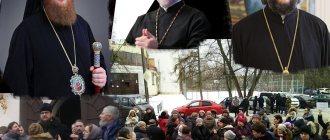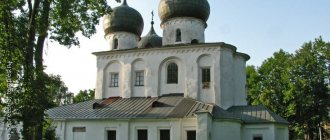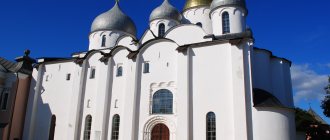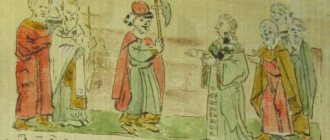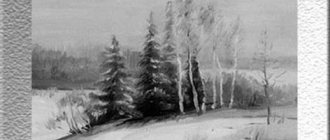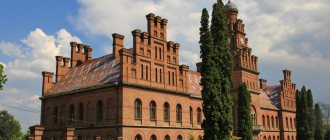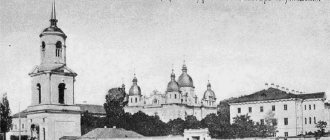| Metropolitan Lev (Tserpicki) |
Lev (Tserpitsky)
(born 1946), Metropolitan of Novgorod and Starorussky, head of the Novgorod Metropolis, holy archimandrite of the Novgorod Yuriev and Valdai Iversky monasteries, rector of the Novgorod Theological School In the world Nikolai Lvovich Tserpitsky, born on April 13, 1946 in the village of Zaluzhye, Stolbtsovsky district, Minsk region Belarus in the family of a priest. Grandfather and father were priests. Father is priest Lev Tserpitsky (1916 - 1972) [1], younger brother is Archpriest Lev Tserpitsky (1948 - 2019) [2].
After graduating from high school, he served in the army from 1966 to 1969.
In 1969 he entered the Leningrad Theological Seminary, and then the academy, from which he graduated in 1975 with a candidate of theology degree for his work “Resolution of the Second Vatican Council “Constitution on Divine Services.”
On March 28, 1971, he was tonsured a monk by Metropolitan Nikodim (Rotov) of Leningrad and Novgorod with the name Leo; on April 7, he was ordained a hierodeacon, and on April 20, a hieromonk.
From 1972 to 1975 he was the personal secretary of Metropolitan Nikodim of Leningrad.
After graduating from the Leningrad Theological Academy, he was sent to Rome, where from 1975 to 1978 he took a theological course at the Pontifical Gregorian University.
On August 8, 1978, he was elevated to the rank of archimandrite and in the same year, as part of the delegation of the Russian Orthodox Church, he was present at the burial of Pope Paul VI and the enthronement of Pope John Paul I.
On October 14, 1978, he was appointed rector of the Cathedral of the Exaltation of the Cross in the city of Petrozavodsk and dean of the churches of the Olonets diocese, where he served as pastor until October 1980, while simultaneously delivering a course of lectures on comparative theology at the Leningrad Theological Seminary.
From September 30, 1980 to December 28, 1982 - rector of the Church of the Resurrection in Rabat (Morocco) [3].
From 1981 to November 1982 he was president of the Ecumenical Council of Churches of Morocco.
In 1982-1983 he served as obedient in the Department of External Church Relations in Moscow.
From October 13, 1983 to October 31, 1987, he was rector of the Transfiguration Cathedral in the city of Vyborg.
On September 10, 1987, he was elected, and on November 1, he was consecrated Bishop of Tashkent and Central Asia in the Trinity Cathedral of the Alexander Nevsky Lavra [3].
Since July 20, 1990 - Bishop of Novgorod and Starorussky.
| Archbishop Leo (Zerpicki) |
On February 25, 1995, he was elevated to the rank of archbishop.
On April 20, 2005, he was appointed rector of the newly opened Novgorod Theological School [4].
On December 27, 2011, he was confirmed as rector (hieroarchimandrite) of the Yuriev Monastery in the city of Veliky Novgorod and the Iversky Valdai Monastery in the city of Valdai, Novgorod Region [5], and the next day, December 28, he was appointed head of the newly formed Novgorod Metropolis [6].
On January 8, 2012, he was elevated to the rank of metropolitan by Patriarch Kirill (Gundyaev) of Moscow and All Rus' in the Patriarchal Assumption Cathedral of the Moscow Kremlin [7].
From March 7, 2015 [8] to May 5 of the same year, he was the temporary administrator of the Petrozavodsk diocese [9].
On June 12, 2021, he was awarded the title of Honorary Citizen of the Novgorod Region.
Awards
Church:
- Order of St. Sergius of Radonezh, III degree (1983)
- Order of the Holy Blessed Prince Daniel of Moscow, II degree (2001)
- Order of St. Seraphim of Sarov, II degree (2006)
- Order of St. Sergius of Radonezh, II degree (2011, with the 40th anniversary of service in the priesthood [10])
- Order of St. Seraphim of Sarov, 1st degree (2016)
- Order of St. Sergius of Radonezh, 1st degree (2021, on the 75th anniversary of his birth [11])
Secular:
- State Order "Badge of Honor"
- honorary citizen of the city of Veliky Novgorod
- Order of Friendship (2016)
- honorary citizen of the Novgorod region (2017)
- Medal "Novgorod Glory" II degree (2017)
education
In 1969 he entered the Leningrad Theological Seminary.
In 1975 he graduated from the Leningrad Theological Academy with a candidate of theology degree. Topic of the candidate's work: “Resolution of the Second Vatican Council “Constitution on Divine Services”.”
In 1975-1978 he took a theological course at the Pontifical Gregorian University in Rome.
Since October 14, 1978, he gave a course of lectures on comparative theology at the Leningrad Theological Seminary.
On April 20, 2005, he was appointed rector of the newly opened Novgorod Theological School[1].
events
- East and West Now and Tomorrow, from a Christian Perspective (Interview) (November 18, 1974)
- Fourth theological interview between representatives of the Roman Catholic Church and the Moscow Patriarchate (June 24, 1975)
- IX General Assembly of Syndesmos (19 July 1977)
- 40th session of the Central Committee of the World Council of Churches (July 17, 1989)
- VIII interview of the delegation of the Russian Orthodox Church with the Pax Christi delegation (March 9, 1990)
- Local Council 2009 (January 27, 2009)
ecumenism
In 1978, as part of the delegation of the Russian Orthodox Church, he attended the burial of Pope Paul VI and the enthronement of Pope John Paul I. In his presence, at the reception of the newly elected pope, the head of the delegation, Metropolitan Nicodemus, died.
In 1981-1982 he was president of the Ecumenical Council of Churches of Morocco.
In June 1996, he attended the opening ceremony of the Catholic Church of Peter and Paul in Veliky Novgorod.
- Metropolitan Nikodim (Rotov), Miguel Arranz, Fr. Lev (Tserpitsky) and Fr. Michael (Boliastis) at the funeral mass for Pope Paul VI. [[1978.
Excerpt characterizing Leo (Tserpitsky)
- What, Fedeshow!... did he say that when the fighting began, you stood closer? They all said that Bunaparte himself stands in Brunovo. - Bunaparte is worth it! he's lying, you fool! What he doesn’t know! Now the Prussian is rebelling. The Austrian, therefore, pacifies him. As soon as he makes peace, then war will open with Bunaparte. Otherwise, he says, Bunaparte is standing in Brunovo! That's what shows that he's a fool. Listen more. - Look, damn the lodgers! The fifth company, look, is already turning into the village, they will cook porridge, and we still won’t reach the place. - Give me a cracker, damn it. - Did you give me tobacco yesterday? That's it, brother. Well, here we go, God be with you. “At least they stopped, otherwise we won’t eat for another five miles.” “It was nice how the Germans gave us strollers.” When you go, know: it’s important! “And here, brother, the people have gone completely rabid.” Everything there looked as if it were a Pole, everything belonged to the Russian crown; and now, brother, he’s gone completely German. – Songwriters forward! – the captain’s cry was heard. And twenty people ran out from different rows in front of the company. The drummer began to sing and turned his face to the songwriters, and, waving his hand, began a drawn-out soldier’s song, which began: “Isn’t it dawn, the sun has broken...” and ended with the words: “Then, brothers, there will be glory for us and Kamensky’s father...” This song was composed in Turkey and was now sung in Austria, only with the change that in place of “Kamensky’s father” the words were inserted: “Kutuzov’s father.” Having torn off these last words like a soldier and waving his hands, as if he was throwing something to the ground, the drummer, a dry and handsome soldier of about forty, looked sternly at the soldier songwriters and closed his eyes. Then, making sure that all eyes were fixed on him, he seemed to carefully lift with both hands some invisible, precious thing above his head, held it like that for several seconds and suddenly desperately threw it: Oh, you, my canopy, my canopy! “My new canopy...”, twenty voices echoed, and the spoon holder, despite the weight of his ammunition, quickly jumped forward and walked backwards in front of the company, moving his shoulders and threatening someone with his spoons. The soldiers, waving their arms to the beat of the song, walked with long strides, involuntarily hitting their feet. From behind the company the sounds of wheels, the crunching of springs and the trampling of horses were heard. Kutuzov and his retinue were returning to the city. The commander-in-chief gave a sign for the people to continue walking freely, and pleasure was expressed on his face and on all the faces of his retinue at the sounds of the song, at the sight of the dancing soldier and the soldiers of the company walking cheerfully and briskly. In the second row, from the right flank, from which the carriage overtook the companies, one involuntarily caught the eye of a blue-eyed soldier, Dolokhov, who especially briskly and gracefully walked to the beat of the song and looked at the faces of those passing with such an expression, as if he felt sorry for everyone who did not go at this time with the company. A hussar cornet from Kutuzov's retinue, imitating the regimental commander, fell behind the carriage and drove up to Dolokhov. The hussar cornet Zherkov at one time in St. Petersburg belonged to that violent society led by Dolokhov. Abroad, Zherkov met Dolokhov as a soldier, but did not consider it necessary to recognize him. Now, after Kutuzov’s conversation with the demoted man, he turned to him with the joy of an old friend: “Dear friend, how are you?” - he said at the sound of the song, matching the step of his horse with the step of the company. - I am like? - Dolokhov answered coldly, - as you see. The lively song gave particular significance to the tone of cheeky gaiety with which Zherkov spoke and the deliberate coldness of Dolokhov’s answers. - Well, how do you get along with your boss? – asked Zherkov. - Nothing, good people. How did you get into the headquarters? - Seconded, on duty. They were silent. “She released a falcon from her right sleeve,” said the song, involuntarily arousing a cheerful, cheerful feeling. Their conversation would probably have been different if they had not spoken to the sound of a song. – Is it true that the Austrians were beaten? – asked Dolokhov. “The devil knows them,” they say. “I’m glad,” Dolokhov answered briefly and clearly, as the song required. “Well, come to us in the evening, you’ll pawn the pharaoh,” said Zherkov. – Or do you have a lot of money? - Come. - It is forbidden. I made a vow. I don’t drink or gamble until they make it. - Well, before the first thing... - We'll see. Again they were silent. “You come in if you need anything, everyone at headquarters will help...” said Zherkov. Dolokhov grinned. - You better not worry. I won’t ask for anything I need, I’ll take it myself. - Yes, well, I am so... - Well, so am I. - Goodbye. - Be healthy... ... and high and far, To the homeland... Zherkov touched his spurs to the horse, which, excitedly, kicked three times, not knowing which one to start with, managed and galloped, overtaking the company and catching up with the carriage, also to the beat of the song . Returning from the review, Kutuzov, accompanied by the Austrian general, went into his office and, calling the adjutant, ordered to be given some papers related to the state of the arriving troops, and letters received from Archduke Ferdinand, who commanded the advanced army. Prince Andrei Bolkonsky entered the commander-in-chief's office with the required papers. Kutuzov and an Austrian member of the Gofkriegsrat sat in front of the plan laid out on the table. “Ah...” said Kutuzov, looking back at Bolkonsky, as if with this word he was inviting the adjutant to wait, and continued the conversation he had begun in French. “I’m just saying one thing, General,” Kutuzov said with a pleasant grace of expression and intonation, which forced you to listen carefully to every leisurely spoken word. It was clear that Kutuzov himself enjoyed listening to himself. “I only say one thing, General, that if the matter depended on my personal desire, then the will of His Majesty Emperor Franz would have been fulfilled long ago.” I would have joined the Archduke long ago. And believe my honor that for me personally to transfer the highest command of the army to a more knowledgeable and skilled general than me, of which Austria is so abundant, and to relinquish all this heavy responsibility would be a joy for me personally. But circumstances are stronger than us, General. And Kutuzov smiled with an expression as if he was saying: “You have every right not to believe me, and even I don’t care at all whether you believe me or not, but you have no reason to tell me this. And that’s the whole point.” The Austrian general looked dissatisfied, but could not help but respond to Kutuzov in the same tone. “On the contrary,” he said in a grumpy and angry tone, so contrary to the flattering meaning of the words he spoke, “on the contrary, your Excellency’s participation in the common cause is highly valued by His Majesty; but we believe that the present slowdown deprives the glorious Russian troops and their commanders-in-chief of the laurels that they are accustomed to reaping in battles,” he finished his apparently prepared phrase. Kutuzov bowed without changing his smile. “And I am so convinced and, based on the last letter with which His Highness Archduke Ferdinand honored me, I assume that the Austrian troops, under the command of such a skillful assistant as General Mack, have now won a decisive victory and no longer need our help,” said Kutuzov. The general frowned. Although there was no positive news about the defeat of the Austrians, there were too many circumstances that confirmed the general unfavorable rumors; and therefore Kutuzov’s assumption about the victory of the Austrians was very similar to ridicule. But Kutuzov smiled meekly, still with the same expression, which said that he had the right to assume this. Indeed, the last letter he received from Mac's army informed him of the victory and the most advantageous strategic position of the army. “Give me this letter here,” said Kutuzov, turning to Prince Andrei. - If you please see. - And Kutuzov, with a mocking smile at the ends of his lips, read in German to the Austrian general the following passage from a letter from Archduke Ferdinand: “Wir haben vollkommen zusammengehaltene Krafte, nahe an 70,000 Mann, um den Feind, wenn er den Lech passirte, angreifen und schlagen zu konnen. Wir konnen, da wir Meister von Ulm sind, den Vortheil, auch von beiden Uferien der Donau Meister zu bleiben, nicht verlieren; mithin auch jeden Augenblick, wenn der Feind den Lech nicht passirte, die Donau ubersetzen, uns auf seine Communikations Linie werfen, die Donau unterhalb repassiren und dem Feinde, wenn er sich gegen unsere treue Allirte mit ganzer Macht wenden wollte, seine Absicht alabald vereitelien. Wir werden auf solche Weise den Zeitpunkt, wo die Kaiserlich Ruseische Armee ausgerustet sein wird, muthig entgegenharren, und sodann leicht gemeinschaftlich die Moglichkeit finden, dem Feinde das Schicksal zuzubereiten, so er verdient.” [We have quite concentrated forces, about 70,000 people, so that we can attack and defeat the enemy if he crosses Lech. Since we already own Ulm, we can retain the benefit of command of both banks of the Danube, therefore, every minute, if the enemy does not cross the Lech, cross the Danube, rush to his communication line, and below cross the Danube back to the enemy, if he decides to turn all his power on our faithful allies, prevent his intention from being fulfilled. Thus, we will cheerfully await the time when the imperial Russian army is completely ready, and then together we will easily find the opportunity to prepare the enemy for the fate he deserves.”] Kutuzov sighed heavily, ending this period, and looked attentively and affectionately at the member of the Gofkriegsrat. “But you know, Your Excellency, the wise rule is to assume the worst,” said the Austrian general, apparently wanting to end the jokes and get down to business. He involuntarily looked back at the adjutant. “Excuse me, General,” Kutuzov interrupted him and also turned to Prince Andrei. - That's it, my dear, take all the reports from our spies from Kozlovsky. Here are two letters from Count Nostitz, here is a letter from His Highness Archduke Ferdinand, here is another,” he said, handing him several papers. - And from all this, neatly, in French, compose a memorandum, a note, for the sake of visibility of all the news that we had about the actions of the Austrian army. Well, then, introduce him to his Excellency. Prince Andrei bowed his head as a sign that he understood from the first words not only what was said, but also what Kutuzov wanted to tell him. He collected the papers, and, making a general bow, quietly walking along the carpet, went out into the reception room. Despite the fact that not much time has passed since Prince Andrei left Russia, he has changed a lot during this time. In the expression of his face, in his movements, in his gait, the former pretense, fatigue and laziness were almost not noticeable; he had the appearance of a man who does not have time to think about the impression he makes on others, and is busy doing something pleasant and interesting. His face expressed more satisfaction with himself and those around him; his smile and gaze were more cheerful and attractive. Kutuzov, whom he caught up with in Poland, received him very kindly, promised him not to forget him, distinguished him from other adjutants, took him with him to Vienna and gave him more serious assignments. From Vienna, Kutuzov wrote to his old comrade, the father of Prince Andrei: “Your son,” he wrote, “gives hope of becoming an officer, out of the ordinary in his studies, firmness and diligence. I consider myself lucky to have such a subordinate at hand.” At Kutuzov's headquarters, among his comrades and colleagues, and in the army in general, Prince Andrei, as well as in St. Petersburg society, had two completely opposite reputations. Some, a minority, recognized Prince Andrei as something special from themselves and from all other people, expected great success from him, listened to him, admired him and imitated him; and with these people Prince Andrei was simple and pleasant. Others, the majority, did not like Prince Andrei, considered him a pompous, cold and unpleasant person. But with these people, Prince Andrei knew how to position himself in such a way that he was respected and even feared. Coming out of Kutuzov’s office into the reception area, Prince Andrei with papers approached his comrade, the adjutant on duty Kozlovsky, who was sitting by the window with a book. - Well, what, prince? – asked Kozlovsky. “We were ordered to write a note explaining why we shouldn’t go ahead.” - And why? Prince Andrey shrugged his shoulders. - No news from Mac? – asked Kozlovsky. - No. “If it were true that he was defeated, then the news would come.” “Probably,” said Prince Andrei and headed towards the exit door; but at the same time, a tall, obviously visiting, Austrian general in a frock coat, with a black scarf tied around his head and with the Order of Maria Theresa around his neck, quickly entered the reception room, slamming the door. Prince Andrei stopped. - General Chief Kutuzov? - the visiting general quickly said with a sharp German accent, looking around on both sides and walking without stopping to the office door. “The general in chief is busy,” said Kozlovsky, hastily approaching the unknown general and blocking his path from the door. - How would you like to report? The unknown general looked contemptuously down at the short Kozlovsky, as if surprised that he might not be known. “The general in chief is busy,” Kozlovsky repeated calmly. The general's face frowned, his lips twitched and trembled. He took out a notebook, quickly drew something with a pencil, tore out a piece of paper, gave it to him, walked quickly to the window, threw his body on a chair and looked around at those in the room, as if asking: why are they looking at him? Then the general raised his head, craned his neck, as if intending to say something, but immediately, as if casually starting to hum to himself, he made a strange sound, which immediately stopped. The door to the office opened, and Kutuzov appeared on the threshold. The general with his head bandaged, as if running away from danger, bent down and walked up to Kutuzov with large, fast steps of his thin legs. “Vous voyez le malheureux Mack, [You see the unfortunate Mack.],” he said in a broken voice. The face of Kutuzov, standing in the doorway of the office, remained completely motionless for several moments. Then, like a wave, a wrinkle ran across his face, his forehead smoothed out; He bowed his head respectfully, closed his eyes, silently let Mac pass by him and closed the door behind himself. The rumor, already spread before, about the defeat of the Austrians and the surrender of the entire army at Ulm, turned out to be true. Half an hour later, adjutants were sent in different directions with orders proving that soon the Russian troops, which had hitherto been inactive, would have to meet the enemy.
Biography[ | ]
Born on April 13, 1946 in the village of Zaluzhye, Stolbtsovsky district, Minsk region of Belarus, in the family of priest Lev Tserpitsky (1916-1972). His grandfather and younger brother were also priests[1].
After graduating from high school, from 1966 to 1969, he served in the Soviet army[2].
In 1969 he entered the Leningrad Theological Seminary[2].
On March 28, 1971, Metropolitan Niim (Rotov) of Leningrad and Novgorod was tonsured a monk with the name Leo[2] in honor of St. Leo, Pope of Rome. On April 7 he was elevated to the rank of hierodeacon, on April 20 - to the rank of hieromonk[2].
In 1972-1975 - personal secretary of Metropolitan Niim (Rotov). Sometimes he flew with documents between Moscow and Leningrad twice a day, for which, according to the memoirs of Archimandrite Augustine (Nikitin), he received the nickname “aeromonk”[3].
In 1975, he graduated from the Leningrad Theological Academy with a candidate's degree in theology (topic of the candidate's work: “Resolution of the Second Vatican Council “Constitution on Divine Services””)[2].
In 1975-1978 he took a theological course at the Pontifical Gregorian University in Rome[2].
On August 8, 1978, he was elevated to the rank of archimandrite and in the same month, as part of the delegation of the Russian Orthodox Church, he was present at the burial of Pope Paul VI, and in September, at the enthronement of Pope John Paul I[2]. In his presence, at a reception with the newly elected pope, the head of the delegation, Metropolitan Niim (Rotov), died.
Since October 14, 1978, by decree of Metropolitan Anthony (Melnikov) of Leningrad and Novgorod, he has been rector of the Cathedral of the Exaltation of the Cross in Petrozavodsk and dean of the churches of the Olonets diocese. At the same time, he read a course of lectures on comparative theology at the Leningrad Theological Seminary[2].
Since October 1980 - rector of the Church of the Resurrection in Rabat (Morocco). From 1981 to November 1982 he was chairman of the Council of Churches of Morocco[2].
In 1982-1983 he worked in the department of external church relations of the Moscow Patriarchate in Moscow[2].
From October 13, 1983 to October 31, 1987 - rector of the Transfiguration Cathedral in Vyborg[2].
Bishop[ | ]
Archbishop of Novgorod and Old Russian Leo in the St. George's Monastery with Russian President Vladimir Putin and Governor of the Novgorod Region Mikhail Prusak.
Novgorod region, August 22, 2001 On September 10, 1987, by decision of the Holy Synod of the Russian Orthodox Church, he was elected Bishop of Tashkent and Central Asia. On October 17, at the end of the All-Night Vigil in the St. John the Theological Church of the Leningrad Theological Schools, he was named Bishop of Tashkent and Central Asia. The naming was performed by Metropolitan Alexy of Leningrad and Novgorod (Ridiger), Metropolitan of Novosibirsk and Barnaul Gideon (Dokukin), Archbishop of Smolensk and Vyazemsky Kirill (Gundyaev), Bishop of Brussels and Belgium Simon (Ishunin) and Bishop of Tikhvin Proclus (Khazov)[4]. On November 1, in the Trinity Cathedral of the Alexander Nevsky Lavra, he was consecrated Bishop of Tashkent and Central Asia. The consecration was performed by the bishops who participated in the naming, as well as by Metropolitan Juvenaly (Poyarkov) of Krutitsky and Kolomna[4].
His appointment to the department coincided with a period of relaxation on the part of the state. Thanks to the efforts of Bishop Leo, four closed churches were revived, and the opportunity arose to expand church activities[5].
On July 20, 1990, he was transferred to the revived Novgorod and Staraya Russian diocese.
After the re-establishment of the diocese, he invited priests from St. Petersburg to join it[6].
During the days of the State Emergency Committee in 1991, he organized a prayer service in the Kremlin, in front of huge crowds of people, in front of the icon of the Sign of the Mother of God for deliverance from the danger of the return of power to the atheists[6].
In 1992, he founded the Sofia newspaper and became its editor-in-chief. In 1996, the publication was transformed into a quarterly magazine with the same name.
In 1992, he headed the organizing committee of the Arseniev Readings in memory of Metropolitan Arseny (Stadnitsky) of Novgorod[7]. The first readings took place in 1993.
The priorities of the Novgorod diocese are cooperation with the university, the development of the Orthodox student movement, active social work and the organization of Sunday schools and libraries in parishes[6].
On February 25, 1995, he was elevated to the rank of archbishop[2].
Being a supporter of the development of interreligious dialogue, in June 1996 he attended the opening ceremony of the Catholic Church of Peter and Paul in Veliky Novgorod[6].
Since July 11, 1997 - member of the presidium of the All-Russian Society for the Protection of Historical and Cultural Monuments[8].
On July 19, 2000, by resolution of the Holy Synod, he was included in the pilgrimage group of the Russian Orthodox Church, sent to Holy Mount Athos in the period from August 4 to August 11, 2000[9].
On October 14, 2004, the mayor of Veliky Novgorod Nikolai Grazhdankin presented the archbishop with the regalia of “Honorary Citizen of Veliky Novgorod”[8].
On April 20, 2005, he was appointed rector of the newly opened Novgorod Theological School[10].
On April 11, 2008, he joined the organizing committee for the preparation and holding of the exhibition “Orthodox Rus'” in Veliky Novgorod from June 18 to 22, 2008[11].
In June 2008, he did not attend the Council of Bishops of the Russian Orthodox Church due to illness[12].
On December 28, 2011, by decision of the Holy Synod, he was appointed head of the Novgorod Metropolis[13]. On January 8, 2012, in the Assumption Cathedral of the Moscow Kremlin, Patriarch Kirill was elevated to the rank of metropolitan[14].
In connection with the death of Metropolitan Manuel (Pavlov) of Petrozavodsk and Karelian on March 7, 2015, with the blessing of Patriarch Kirill, he was appointed temporary administrator of the Petrozavodsk and Karelian diocese. Performed duties until May 5, 2015[15].
On the eve of the refusal of the Russian Orthodox Church to participate in the Council on the island of Crete, he was sent to Istanbul at the head of a delegation to participate in the celebration of the namesake of Patriarch Bartholomew I of Constantinople (June 11, 2021)[16].
Links
Archbishops of Novgorod John II • Gregory • Martyriy Rushanin • Mitrofan • Anthony (Yadrejkovic) • Arseniy Chernets • Spyridon • Dalmatian • Clement • Theoktist • David • Moses • Vasily Kalika • Alexy • John III • Simeon • Theodosius I • Euthymius (Bradaty) • Euthymius II • Jonah • Theophilus • Sergius • Gennady (Gonzov) • Serapion I • Macarius I • Theodosius II • Serapion II (Kurtsev) • Pimen Cherny • Leonid Metropolitans of Novgorod Alexander (Berdov) • Varlaam (Belkovsky) • Isidore • Macarius II • Cyprian (Starorusennikov) • Afphonius • Nikon (Minin) • Macarius III • Pitirim • Joachim (Savelov) • Korniliy • Euthymius III (Rylkov) • Job • Theodosius (Yanovsky ) • Feofan Prokopovich • Ambrose (Yushkevich) • Stefan (Kalinovsky) • Dimitri (Sechenov) • Gabriel (Petrov) • Ambrose (Podobedov) • Feognost (Lebedev) • Gury (Okhotin) • Arseny (Stadnitsky) • Joseph (Petrovykh) • Alexy (Simansky) • Venedikt (Plotnikov) • Nikolay (Yarushevich) • Sergiy (Golubtsov) • Lev (Tserpitsky) UzSSR Innokenty (Pustynsky) • Luka (Voino-Yasenetsky) • Sergius (Lavrov) • Nikander (Fenomenov) • Afanasy (Malinin) • Arseny (Stadnitsky) • Boris (Shipulin) • Kirill (Pospelov) • Gury (Egorov) • Ermogen (Golubev) ) • Gabriel (Ogorodnikov) • Plato (Lobankov) • Bartholomew (Gondarovsky) • Lev (Tserpitsky) • Vladimir (Ikim) Uzbekistan Vladimir (Ikim) • Vikenty (Morar)
hierarchy
On March 28, 1971, Metropolitan Nikodim (Rotov) of Leningrad and Novgorod was tonsured a monk, from April 7, 1971 - hierodeacon, from April 20, 1975 - hieromonk. On August 8, 1978, he was elevated to the rank of archimandrite.
From 1972 to 1975 - personal secretary of Metropolitan. Nikodim (Rotov)[2].
Since October 14, 1978 - rector of the Cathedral of the Exaltation of the Cross in Petrozavodsk and dean of the churches of the Olonets diocese.
Since October 1980 - rector of the Church of the Resurrection in Rabat (Morocco).
From October 1983 to October 1987 - rector of the Transfiguration Cathedral in Vyborg.
Since November 1, 1987 - Bishop of Tashkent and Central Asia.
Since July 20, 1990 - Bishop of Novgorod and Starorussky.
On February 25, 1995, he was elevated to the rank of archbishop.
By the decision of the Holy Synod of December 28, 2011, he was appointed head of the Novgorod Metropolis.
On January 8, 2012, he was elevated to the rank of metropolitan.
Since March 2015, temporary administrator of the Petrozavodsk and Karelian diocese.
